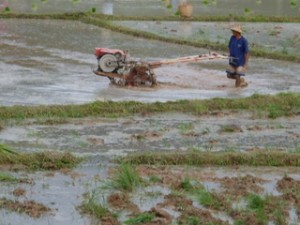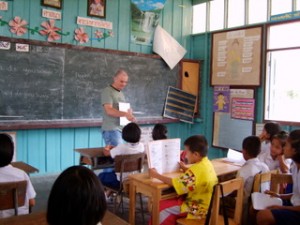Fond Memories of Working in a Thai Village School
I haven’t got around to writing another episode of Why Does the Foreign Teacher Always Smell Like Peppermint, but here is something in the meantime.
Fond Memories of Working in a Thai Village School
I worked in a Thai village school for five years. This was a wonderful period of my life and sometimes I miss it. Chat Trakan is 120 kilometres from Phitsanulok – the nearest city. It is a part of Thailand that is so out of the way that even 7eleven doesn’t open a branch there, and the nearest one was 50km in Nakhon Thai.
The reason we moved to such a rural location was that my wife had grown up there. We had been living in Phitsanulok city but the promise of a more peaceful existence appealed to me. Chat Trakan is actually the general name for the area and her village is called Muu Baan Pak Rong which means ‘village at the mouth of the river Rong’.
Enthusiastic Village Students Learning to be Rice Farmers
I had been teaching in Bangkok a couple of years before moving to Pak Rong. I’d left because I felt like a bit of a fraud without proper teaching qualifications. I fell in love with teaching so I decided to study by distance learning to get the qualifications I needed. All I had to do was return to Ireland once a year for exams. In the meantime I decided to gain experience by volunteering at our local village school.
Pak Rong Village school is a rong rian pratom which is the Thai name for primary school. It was decided that I would only be teaching primary 3-primary 6; students aged nine to twelve years old. It was also decided that I should teach only on Fridays so as to not interrupt the normal schedule too much. The local teachers were delighted that I would be teaching English, but felt that it wasn’t such an important subject for young children who were mostly destined to become rice farmers. My classes would be considered extra-curricular, but all the students would be expected to attend.
Our local school had been built completely from wood obtained from the nearby jungle. My first impression was that it seemed like something out of a different century; a far simpler time. Like much in the village the school was built for functionality, but it did look kind of beautiful in rustic way nevertheless. As well as the brown wood there was also colorful paint to brighten up the place, and it completely suited the tropical location. The only evidence of the 21st century was the computer, but even that looked out-dated and it wasn’t connected to the internet. The school population was very small with less than eighty students.
My only other teaching experience had been in Bangkok high schools, and this did little to prepare me for a village school. The first shock was that nobody could speak a word of English. Not even the English teachers could hold a conversation in the language. The next shock was that there was no course syllabus for me to follow. The teachers had been using a textbook, but when I tried to use it I found that it was far too basic for a conversation class. These English textbooks didn’t go much beyond ABC and, “what is your name?” and my expectations for the students were far higher than this. I decided to leave the textbook to the Thai teachers, and they seemed pleased with this suggestion. I would need to create my own syllabus, but this was going to be a challenge – the school kids were unable to read English. All learning would need to be done purely through speaking and listening.
Teaching English in Rural Thailand with an Irish Accent
The classroom that I would be using had no chairs or desks, but the students were well used to sitting on the floor. This is the position from which they ate their food, watched television, and did their homework. If a household did possess a chair it would be only for ornamental purposes.
I found that what the students lacked in knowledge about English they made up for in enthusiasm. They didn’t just repeat the words that I was teaching them, but they would scream the words back at me while laughing and trying to mimic my Irish accent – they thought it all great fun. Some of the younger students cried when they first saw me enter the classroom. They had no previous dealings with a ‘farang’- the Thai word used to describe white-faced foreigners. After a couple of classes though these fearful students would be laughing and play-acting with the rest.
We played a lot of games during class time. I found that this was the best strategy for keeping them engaged in the lesson. They gained new vocabulary far easier when it felt fun. Their favorite activity was the running game. I would make cards with pictures of the vocabulary we were currently working on, and when I called out the word two competing students would need to run the length of the classroom in search of that picture. They would be so full of energy that I often worried that they might do themselves an injury, but they never did.
In Pak Roong school I taught on Fridays. Thai school children have a different uniform for nearly every day of the week. On Fridays they wore an old-fashioned farmer’s garb; the sort of uniform that I previously associated with communist China during the 1960’s. When I first noticed the students wearing it I was half-expecting them to also remove a little red book from their pockets and for them to begin waving it at me.
Village Students Taught Me a Lot
During my time teaching these children I began working towards my Post-Graduate Certificate in Education. In reality I did most of my learning while teaching these village students. They made me think about how to keep them engaged. If I lost them during a lesson then I would need to work hard to get them back on course. I developed strategies; I became better at teaching. I would go to a lesson and mess up by boring the students, but the next week I would try something different. This way I slowly found what worked and what didn’t work.
Working in the local village school meant that I soon became well-known by all the local village children. I felt a bit like a celebrity. It was nice. After a few years doing it I really began to feel like a part of the local community, and it felt like a great privilege to be a part of these young people’s lives. This is when I really fell in love with teaching.
I now live on the outskirts of Bangkok but still like to check up on my former students when visiting the village – some of them now have jobs. It is easy to miss that simpler time.
Update on Dead Drunk – Maverick House has announced that Dead Dunk will be available as an eBook on Kindle from this evening (GMT). I’ll provide a link when I get one.




Paul, what a great lovely to share. Your time there as the farang English teacher is sure to have molded lives. Were there any students that stood out? That were excited about learning English enough to continue on?
Hi Catherine, there were a few of them that I’ll never forget. It was eight years ago when I began teaching there. I go back to the village and some of my students are now adults – it makes me feel old 🙁
Paul a nice read to wake up too. Makes me think I ought to do something in our local school since I already help adult learners on a Sunday.
You made me smile about the Maoist uniform, I see from the photos you declined to dress in a similar fashion 😉
Hi Mike, I’ll never regret that time spent teaching in the local school. It really makes you feel part of the community. I honestly believe that Thais have a lot of respect for foreigners who give up their time like this. BT, I’m going to add a picture of the uniforms so that people will see what I mean.
Paul, what a wonderful experience and especially to be accepted into a small community. I wonder if your prior students still speak with an Irish lilt? 😉
Paul, a smashing post.
There’s something about village kids which to my mind differs them from city kids. The village boys and girls appear to have a lot more respect for their elders. I’m not saying the city and townie kids are bad but they do have a little, perhaps minuscule would be a better word, touch of English street kid mentality about them. When the day comes, and it will, and Thailand suffers with kids running havoc in the city streets, causing minor damage and generally being a nuisance, I think it will be quite a few years after before the disease spreads to the rural areas.
Your post reads like maybe one day you will return to Ban Pak Rong and teach again in some minor capacity.
Hi Martyn, I’d never say never but I doubt we’ll be moving back to rural Thailand any time soon – at least not until my son finishes school anyway. I actually like where we are living now because it is so handy for the city and the coutryside.
Hey Paul what do those local village schools actually pay for foreign teachers? And have you ever thought about a return to the classroom someday?
Hi Mark, the school once offered to pay me 10,000 a month to stay there, but I couldn’t work for that amount. There are a few foreign teachers who can make about 30,000 in the big rural schools, but they don’t tend to stay long – at least where we were. I’d never say never, but I’ve no plan to go back teaching.
10,000 baht isn’t horrendous, assuming the cost of living is much lower in rural Thailand. Any idea what a single guy would spend over there in a month? I don’t really go for the night life and am mostly interested in housing, food, and transport costs. Thanks!
Hi Francisco, a single guy would still probably get away with 10,000 THB in rural Thailand if they didn’t drink alcohol and stuck to Thai food. You could rent a house for about 2,000 THB and if you had a motorbike your fuel costs wouldn’t be too much.
Thanks for the prompt reply! Btw, if you were only working the one day a week at that school, would it be possible to find other employment the rest of the week?
Other employment doing what? There is not much choice in rural Thailand unless you want to invest money in your own business.
Perhaps doing the same thing in a neighbouring town? Surely, there are other towns with schools in the area, which are in need of a farang English teacher?
You might be able to get work in more than one school, but if you intend to live away from the towns most of these places won’t be able to pay you. It would also be a huge headache to work legally because you would have to get a work permit for each school. I volunteered in two village schools so this was less of an issue. Your best bet would be to find an agency who would employ you to do this, but I’m not sure if that is still possible – it used to be. If you are going to be working in surrounding towns you will also end up spending more on transportation.